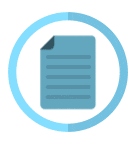The effect of WebQuest on students’ writing skill
Keywords:
Writing, WebQues, Descriptive TextAbstract
This research investigated WebQuest in Writing Skill Descriptive Text. Writing is an activity of the ability to think and express ideas and find information in describing object that is contained by using the features of WebQuest application and producing good and interesting work for the readers. This research aimed to find out the effectiveness of using WebQuest in Writing Descriptive Text on the significant difference score achieved by students before and after WebQuest applied.. The design of this research used quantitative with pre-experimental design that includes one group pre-test and post-test. The population of this study was the tenth grade students of MA Al-Ibrohimy Galis in the academic year of 2018/2019. The data was obtained by administering Writing test. The research was started by giving pre-test, treatments, and post-test to the experimental class. The data of the test were analyzed by using dependent T-test. The results indicate that the use of WebQuest seems to be more effective in teaching learning process. The score of students’ post-test have higher than before have been taught by WebQuest. Based on the findings of this research, using WebQuest media appears to be a plausible alternative for teaching English Writing Skill in Descriptive Text to the tenth year students of MA Al-Ibrohimy Galis.
Downloads
Published
How to Cite
Issue
Section
License
1. Copyright of this journal is possession of Editorial Board and Journal Manager, by the knowledge of author, whilst the moral right of the publication belongs to the author.
2. Legal formal aspect of journal publication accessibility refers to Creative Commons Atribution-ShareAlike (CC BY-SA), implies that this license lets others remix, adapt, and build upon your work even for commercial purposes, as long as they credit you and license their new creations under the identical terms. This license is often compared to “copyleft” free and open source software licenses.
3. Every publications (printed/electronic) are open access for educational purposes, research, and library. Other that the aims mentioned above, editorial board is not responsible for copyright violation















